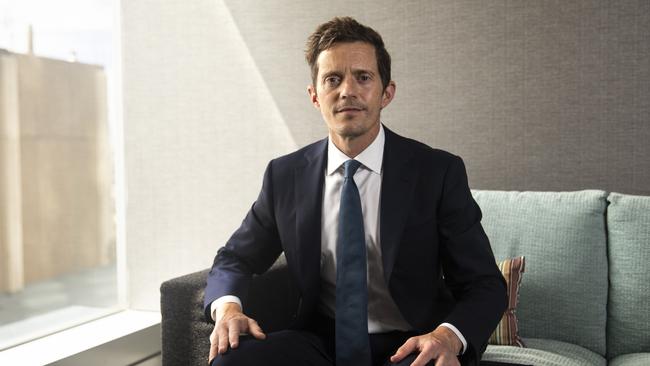After the Suisse rescue, UBS downgrades its outlook for banks and property
UBS is advising investors to steer clear of banks, building materials and real estate companies.

UBS sees a weak earnings outlook for domestic cyclical companies and tells investors to steer clear of banks, building materials and real estate companies as consumers feel the sting of surging rates.
The Swiss investment bank’s Australian equities strategist, Richard Schellbach, lowered its year-end target for the S&P/ASX 200 index from 7500 points to 7250.
He says the investment case for equities has “softened” as the risks have “undeniably stepped up” as a result of the recent banking crisis in the US and euro area.
“The outlook for earnings growth now looks anaemic, with risks building towards an acceleration of downgrades as mid-year pressure points hit the Aussie consumer,” he said.
A lagged impact of RBA hikes on households is set to be magnified by expiring fixed-rate mortgages. “Thankfully the sharp de-rate valuations we saw last year provide some support,” he adds.
UBS expects the Reserve Bank to end its interest rate hiking cycle by May and then start cutting just before year end. The overall sharemarket is expected to “track sideways”, but such “rate plateaus” tend to hurt domestic cyclical companies while favouring defensive growth companies.
“Prior periods where the RBA plateaued saw growth stocks outperform value and large beat small companies,” Schellbach says. “Insurance has been the most consistent winner, followed by healthcare and energy, while real estate, industrials and consumer discretionary underperform.”
Banks are expected to be in the firing line and UBS has downgraded the sector to underweight.
The healthcare sector has been upgraded to neutral because of its defensive nature.
“But with risks having undeniably stepped up, the case for equities has softened and therefore we revise down our year-end target for the ASX200 index.”

It came as the US sharemarket tumbled again after the Federal Open Market Committee meeting.
While the Fed raised interest rates just 25 basis points, as expected, the S&P 500 index dived 1.7 per cent as Fed chair Jerome Powell said FOMC officials “don’t see rate cuts this year”, and Treasury Secretary Yellen said Treasury wasn’t considering “blanket” insurance for US bank deposits.
That came after weekend reports that officials were considering widening FDIC insurance for bank deposits beyond the current limit of $US250,000 ($380,000).
JPMorgan CEO Jamie Dimon’s efforts to craft a new rescue plan for First Republic Bank – shares of which dived 16 per cent on Wednesday – are yet to bear fruit.
There have also been reports that Warren Buffett has been in touch with Biden Administration officials about the regional banking crisis and that he could possibly invest in the sector.
Schellbach says recent developments have “further eroded” the conviction of domestic equity investors, who were already “baffled” by many of the market moves in the past six months.
From his point of view, these recent developments reinforce his call for ‘‘disinflation’’.
“The domestic economy is still benefiting from strong tailwinds, but will slow sharply towards the end of the year,” Schellbach says. “Earnings downgrades have further to run, but won’t collapse due to solid underlying fundamentals.

“Transitioning into the ‘earnings-driven’ stage of the cycle guides us towards stocks which offer non-cyclical growth opportunities and/or secure dividend streams.”
Similarly, Ausbil Australian Small Cap Fund co-portfolio managers Arden Jennings and Andrew Peros say investors need to consider what sectors will benefit as inflation falls back.
“While we believe earnings growth in 2023 will undershoot the last two years, there are companies with earnings upside that are yet to be appreciated by consensus,” they say. “There are also quality leaders whose earnings are immune to the vagaries of the cycle. This is where we are seeing the potential for outperformance in the financial year 2023.”
But Citi chief economist Josh Williamson sees Australian inflation remaining “stickier for longer”, with a year-end inflation forecast of 5.4 per cent versus a consensus of 3.5 per cent.
“Our reasoning is based on the fact that food and services inflation will persist in 2023, while goods deflation may not be as acute because of still-elevated costs for businesses,” Williamson says.
While goods deflation could accelerate on the back of softening demand, strong underlying household demand for services, a tight labour market, and a pick-up in wages growth points to ongoing services inflation in 2023.
Williamson also expects developments in the housing market to underpin price rises.
Construction costs are set to remain elevated although they have declined from high levels.
A large pipeline for residential construction still implies that owner-occupier dwelling costs will increase in 2023.




To join the conversation, please log in. Don't have an account? Register
Join the conversation, you are commenting as Logout